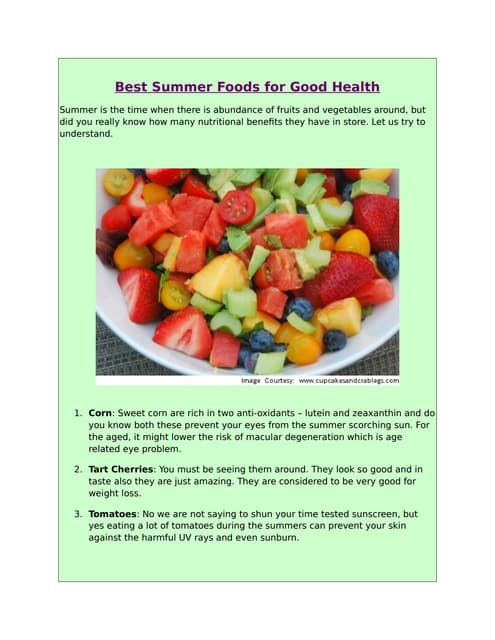Top 10 Foods For Summer Season 24
Foods For Summer Season
We naturally have more of a need for light, refreshing, and hydrating foods when the temperature rises and the days lengthen. Summertime is the ideal time of year to enjoy a wide variety of colorful, nutrient-dense meals that not only help us stay cool but also give us the vitamins and minerals we need to stay strong and healthy. Savoring the abundance of summer produce will add delicious and nutrient-dense flavors to your meals.

Follow our Digiknowledge.co.in page for the latest updates about technology, bikes, cars, sports, lifestyle, and many more.
The summer season provides a plethora of foods that meet our need for hydration and renewal, from crisp cucumbers that provide a refreshing snap to salads to luscious watermelons that quench our thirst.
Summer flavor is accentuated on our plates by adaptable crops like maize and zucchini, and vitamins and antioxidants abound in sweet berries, tart citrus fruits, and verdant greens.
These seasonal favorites can change your diet and improve your summertime dining experience, whether you’re grilling peaches for a smokey dessert or eating Greek yogurt with fresh toppings.
We’ll go over the Top 10 Foods for Summer Season staples in this article, emphasizing their nutritional value and offering mouthwatering recipes to include them in your diet. Prepare to enjoy the bounty of the season, keep hydrated, and eat well throughout the summer.
Watermelon
With more than 90% water content, watermelon is the ideal summertime fruit for staying hydrated. It is high in antioxidants, including lycopene, which promotes heart health and may shield against UV damage, and vitamins A, B6, and C. Furthermore, watermelon contains magnesium and potassium, which are essential for maintaining electrolyte balance and supporting muscle performance.
Ways to consume
For a cool, nutrient-dense boost, add watermelon to summer salads and smoothies, or just eat it fresh as a snack. This luscious fruit provides vital nutrients to support overall health during the warmer months, in addition to helping you stay cool.
Cucumbers
As they are almost entirely made of water, cucumbers are cooling and hydrating. They are high in potassium, magnesium, and vitamins K and C, all of which improve general health and aid with hydration. They are also low in calories. Digestion is aided by their high fiber content.
Savor cucumber slices in salads, as a crisp snack, or steeped in water to create a refreshing beverage.
Berries, such as Raspberries, Blueberries, and Strawberries
Berries are superfoods that are high in fiber, manganese, vitamins C and K, and antioxidants. They promote heart health, reduce inflammation, and enhance skin health.
Berries are low in calories and high in sweetness, making them a great choice for smoothies, oatmeal, or yogurt as snacks.
Tomatoes
Tomatoes are a good source of potassium, folate, and vitamins C and K. Their elevated level of the antioxidant lycopene can help maintain heart health and shield against sun damage. Tomatoes are tasty and versatile foods that go well with salads, chilled gazpacho, or just sliced and drizzled with olive oil.
Leafy Greens (Arugula, Spinach, and Kale)
Leafy greens are rich in nutrients, including calcium, iron, and the vitamins A, C, and K. They promote immunity, strengthen bones, and enhance skin health. To add a healthy boost to your meals, sauté them as a side dish, combine them into smoothies, or use them in salads.
Oranges, Lemons, and Limes (Citrus fruits).
Vitamin C, which strengthens the immune system and improves skin health, is abundant in citrus fruits, making them refreshing. They also offer antioxidants, potassium, and fiber.
Savor citrus fruits as a marinade for grilling, as a fresh squeezed juice, or blended into water
Zucchini
Zucchini is a low-calorie, high-fiber vegetable that is high in potassium, vitamins C and B6, and other nutrients. It aids in blood pressure regulation and promotes good digestion.
A healthy and adaptable choice, zucchini can be grilled, spiralized into zoodles, or used in salads and casseroles.
Peaches
Packed full of vitamins A and C, fiber, and antioxidants, peaches are also juicy and sweet. They promote overall wellness, healthy digestion, and healthy skin. Savor peaches raw, grilled for a smokey taste, or blended into pies and cobblers for a delicious summer dessert.
Ear corn
A staple of summer cuisine, corn on the cob boasts a high fiber content, important minerals like potassium and magnesium, and vitamins B and C. It gives energy and promotes digestive health. You can boil and season it, grill it with butter and salt, or add the kernels to salsas and salads.
What type of food do we eat in summer season?
Consume an abundance of fruits and vegetables that are high in water content, such as cucumbers, musk melon, and watermelon. Eat and consume foods and beverages that include onions, tulsi, and mint. Consume meals that are healthy, light, and low in fat.
How should we keep the cooked food during the summer season?
Foods can acquire bacteria in as little as two hours at room temperature, so it’s important to refrigerate cooked meals and all perishables as soon as possible. Store all cooked and perishable food in the refrigerator, ideally below 5 degrees Celsius.Even in a refrigerator, don’t keep food for extended periods of time. Eat it up right now.
What is the importance of summer food?
Consuming seasonal fruits and vegetables provides us with UV protection because they are high in water content and nutrients. Junk food, such as pizza and burgers, should be strictly avoided in the summer.
How long does food stay in the summer?
In cases where the outside temperature reaches 90°F (32°C) or more, that duration is reduced to one hour. Food has typically “gone bad” at that point and is likely to cause illness to those who consume it. With one notable exception to this rule, cold food can be left out for up to six hours, provided it doesn’t become much hotter than 70°F (21°C).




